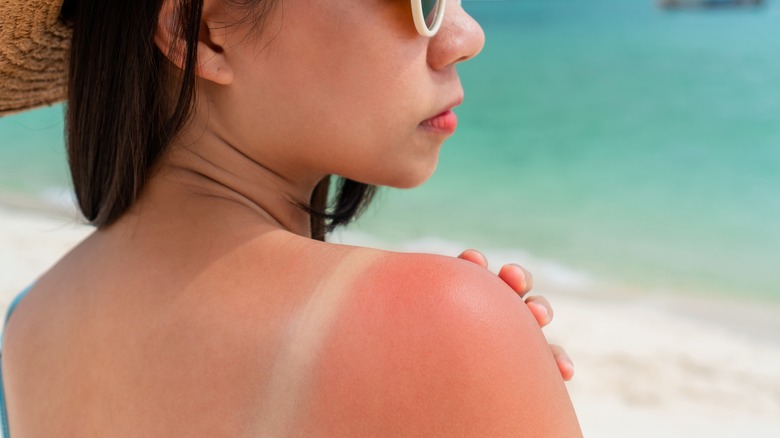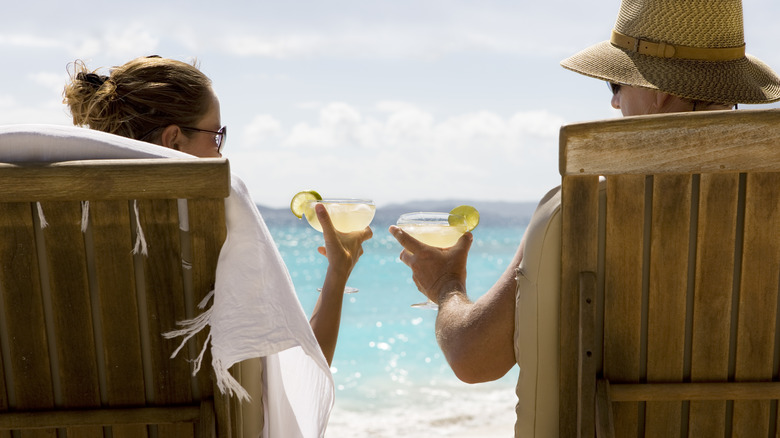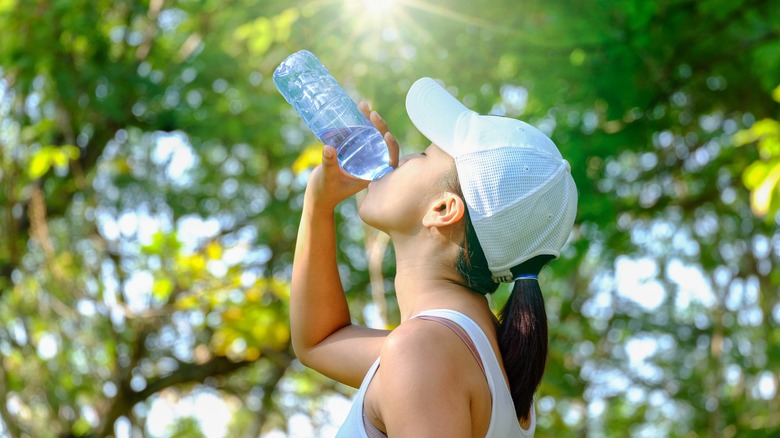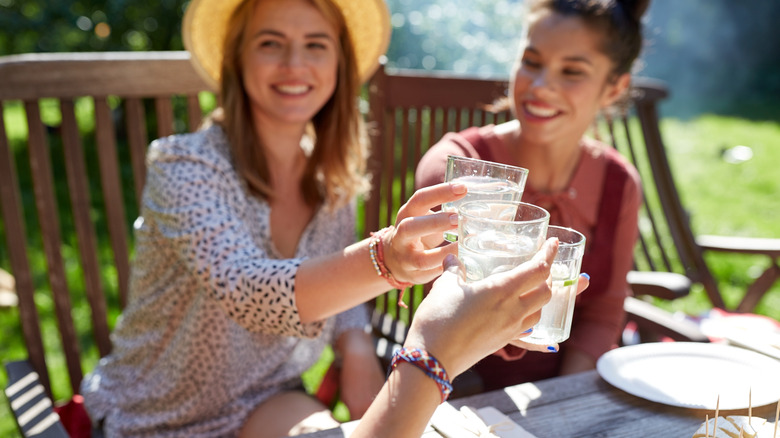Reasons You Should Think Twice About Drinking In The Summer Sun
As the weather starts to warm up during the summer months, we tend to get excited. For many people, summer means a well-deserved break from school, relaxing vacations, a little more quality time with family and friends, and the opportunity to soak up some vitamin D.
In the pursuit of a fun and memorable summer, many people turn to drinking alcohol in social situations, as well as in private. For better or worse, alcohol consumption is fairly common in American culture. In a 2021 survey conducted by Gallup, 60% of American adults reported drinking alcoholic beverages, with people between the ages of 35 and 54 having the highest percentage of drinkers.
There can sometimes be deeper motivations for drinking alcohol, like using it as a way to cope with stress, anxiety, and other mental health challenges, as explained by Riverside Recovery. Some people may feel that drinking alcohol gives them "liquid courage" in social settings where they may otherwise feel awkward or shy. A 2014 article published in the Shanghai Archives of Psychiatry explained that people may find alcohol enjoyable because it activates the reward system in the brain by releasing the neurotransmitter dopamine.
It could seem tempting to drink alcohol while lounging around in the sun on a warm summer day, but you should avoid it. Drinking out in the sun has been associated with adverse effects like sunburn, dehydration, heat stroke, and an increased likelihood of being in car and boating accidents.
It can damage your skin and contribute to skin cancers
We all know the summer sun is notorious for damaging your skin if precautions aren't taken to prevent sunburn. However, you may be surprised to learn that drinking alcohol could actually exacerbate sunburns. One 2020 study published in the Journal of Dermatological Science used mouse models to investigate the effects that ultraviolet (UV) radiation exposure combined with alcohol consumption have on the skin. The researchers discovered that excessive UV radiation and alcohol consumption can contribute to inflammation, sunburns, and potential damage to DNA. It's believed that alcohol interferes with the body's ability to safely absorb UV radiation, according to the researchers.
Another 2015 analysis published in The American Journal of Clinical Nutrition examined the association between alcohol and basal cell carcinoma (BCC) in women and men. BCC is a common form of skin cancer that's believed to be triggered by excessive UV exposure. The results of the study suggested that participants who consumed alcohol more often were at an increased risk of developing BCC, which was particularly true for women between the ages of 18 to 22 years. White wine and liquor had the strongest association with increased BCC risk.
Along with BCC, combining alcohol with sun exposure may contribute to other forms of skin cancers, such as melanoma (via Molemap). According to Dr. Niyati Sharma, drinking alcohol in the sun can accelerate the rate at which you get a sunburn.
It can lead to margarita burn
Margarita fans may be disappointed to find out that drinking their favorite cocktail while basking in the sunlight can contribute to a unique form of sunburn called the "margarita burn." More formally referred to as phytophotodermatitis, margarita burn is a skin condition brought on by the combination of sun exposure and psoralens found in citrus fruits like limes, as described by Bon Appetit.
UV rays from the sun are more likely to harm your skin if you've consumed or touched foods containing psoralens, as they can make you burn more quickly. "A burn that would typically happen in half an hour can happen in minutes, or a burn that would happen in an hour could happen in 15 minutes," Lindsey Bordone, MD, explained to Bon Appetit.
Although citrus fruits are the most common culprit, it's also possible to get margarita burn from the celery used as a garnish in Bloody Marys. Margarita burns can resemble a poison ivy rash and leave hyperpigmentation on the skin that can last a few months, according to the Cleveland Clinic. Individuals with lighter skin tones are at an increased risk of acquiring a margarita burn after coming in contact with psoralens and being out in the sun.
It can make you dehydrated and increase the risk of heat stroke
There are other health risks to drinking alcohol in the sun besides getting a bad burn. Alcohol's diuretic properties can lead to dehydration, particularly in hot weather, as your body loses fluids through perspiration, according to Alcohol Rehab Guide. Consuming alcohol also makes you urinate more frequently, and drinking too much can lead to vomiting, which further dehydrates you.
When out in the summer sun, it's not wise to drink alcohol without having eaten something beforehand. Alcohol enters the bloodstream more quickly when consumed on an empty stomach and dehydrates you faster, as pointed out by Healthline. If you do drink alcohol out in the sun, some signs that you may be dehydrated are extreme thirst, dry skin, feeling lightheaded, and having an elevated heart rate, as listed by Johns Hopkins Medicine.
It's important to address dehydration as soon as possible because it can lead to a heat stroke in severe cases. Consuming alcohol on a hot day impairs the body's ability to cool itself down. When dehydrated, the body can lack enough fluids to sweat and maintain a normal temperature, resulting in a heat stroke.
It can cause accidents
Since alcohol can have disorienting effects and lead to poor decision-making, there are times when drinking in the summer sun can have fatal consequences. According to the Centers for Disease Control and Prevention (CDC), alcohol plays a role in 70% of deaths related to boating, swimming, and other activities that take place in or on the water. Consuming alcohol while participating in these activities can increase the risk of drowning. This is due to its effect on coordination and balance, as well as its tendency to contribute to high-risk behavior.
These fatal accidents don't only happen in the water, either. As pointed out by the Alcohol Rehab Guide, driving under the influence and getting into car accidents is seen more often during the summer months. This is especially true around holidays associated with heavy drinking, like Memorial Day, Labor Day, and the 4th of July. Independence Day is projected to be the most dangerous summer holiday on the road, as the risk of dying in an accident caused by drunk driving increases by 78%, as noted by Kicklighter Law.
The National Highway Traffic Safety Administration reported that there were 13,384 fatalities in 2021 related to driving under the influence of alcohol. Driving under the influence is extremely dangerous and can affect one's short-term memory and attention to the road, as well as their ability to steer and detect environmental signals. It can also take the lives of others as well as your own.
How to drink safely in the summer months
You can have a fun and memorable summer by drinking responsibly and keeping a few tips in mind. As noted by the National Institute on Alcohol Abuse and Alcoholism, you should never drink while operating a car or boat, and should refrain from drinking before swimming to decrease the risk of drowning.
If you're drinking alcohol out in the summer sun, you should make sure to eat nutritious food so you aren't drinking on an empty stomach. You should also keep yourself hydrated by drinking plenty of water, as described by MDLinx. Keeping track of how many drinks you've consumed will help you avoid overindulging, and decrease the risk of becoming dehydrated or experiencing a heat stroke. You can also take care of your loved ones by making sure they have a safe ride home from a gathering, whether that be from a designated driver or a taxi service.
If you find yourself drinking during the summer months in ways that are unsafe, you can speak with your primary care doctor for guidance on how to manage your drinking. You may also find alcohol support groups helpful, as you can share your experiences with others who may understand what you're going through, as pointed out by Medical News Today.
If you or anyone you know is struggling with addiction issues, help is available. Visit the Substance Abuse and Mental Health Services Administration website or contact SAMHSA's National Helpline at 1-800-662-HELP (4357).






